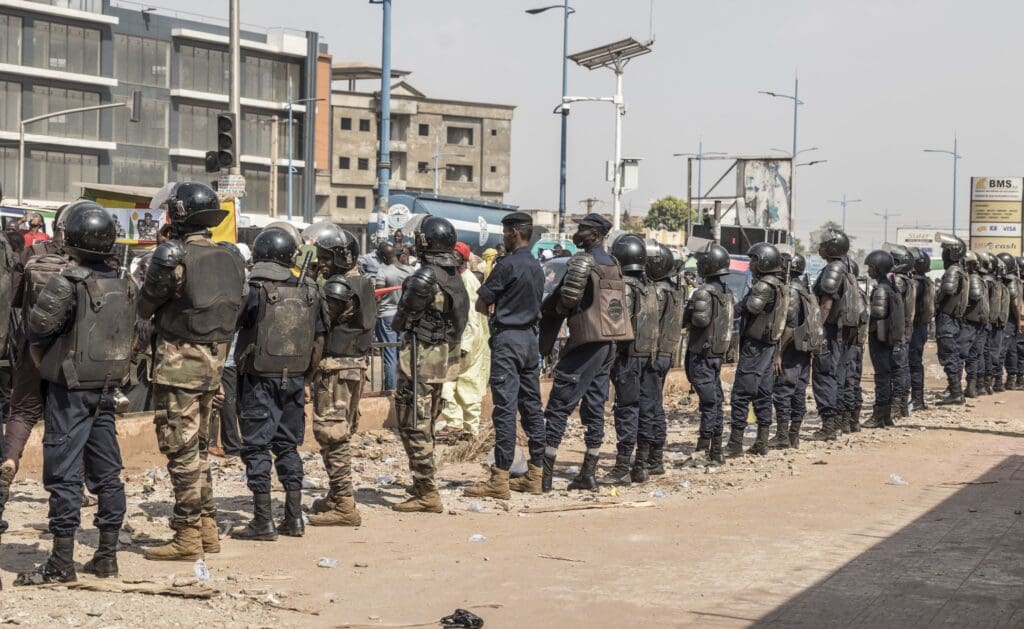Long-simmering tensions between Algeria and Mali have threatened to boil over in recent weeks after a series of explosive incidents took place along their border. On April 1, Algeria shot down a Malian armed drone over Tin Zaoutine, a sensitive frontier zone. The two sides both claimed it occurred in their own airspace. In response, Mali withdrew from the Comité d’Etat Major Opérationnel Conjoint (CEMOC), a regional counterterrorism initiative headquartered in Algeria, and the Alliance of Sahelian States (AES)—a group comprising Mali, Niger and Burkina Faso—and recalled their ambassadors from Algiers. Within days, Algeria and Mali both closed their airspace to the other’s aircraft.
The April incident followed another, less than two weeks earlier on March 17, in which a Malian drone fired on and destroyed Algerian-owned trucks near the border, claiming the vehicles were transporting supplies to Tuareg rebel groups—leading Algiers to vow retaliatory action. Without swift yet careful diplomacy, the situation could spin out of control.
Two Different Approaches
Recent tensions are rooted in the Libyan uprising that began in early 2011 and led to the fall of Moammar Gadhafi’s regime later that year. The ensuing turmoil triggered a return of armed Tuareg insurgents to Mali, kicking off tribal and Islamist rebellions in the north of the country. Algeria—which shares a nearly 1,400-kilometer (870-mile) porous border with Mali and has its own Tuareg population with ties in neighboring countries—quickly moved to mediate to avoid a regionwide fragmentation. Its efforts culminated in the 2015 Algiers Accord—a UN-endorsed peace and reconciliation agreement signed in the Algerian capital between Bamako and a coalition of Tuareg communities, including some separatists.
However, successive coups in Mali in 2020 and 2021 empowered an aggressive and inexperienced military junta in the country. Led by Colonel Assimi Goïta, the new government in Bamako renewed fighting in the north with the help of Russia’s Africa Corps mercenaries—previously the Wagner Group. Algeria’s insistence on mediating with Tuareg and other opposition groups in the interest of regional stability was reinterpreted by Mali’s new government as interference, and suspicion of its northern neighbor deepened. Even Algeria’s successful effort to prevent the Economic Community of West African States (ECOWAS) from militarily intervening in the Sahel in 2023, after a series of coups reordered the region’s politics, did not alter feelings in Bamako or break the diplomatic impasse.
Point of Contention
Persistent security concerns in the Sahel remain at the heart of state-to-state tensions. The Sahel region is a hotspot for violent extremism, plagued by jihadist factions such as Al Qaeda in the Islamic Maghreb (AQIM), Jama’at Nusrat al-Islam wal-Muslimin (JNIM) and Islamic State in the Greater Sahara (ISGS). Armed conflict has intensified as groups have exploited the region’s weak governance and intercommunal tensions.
The withdrawal of the UN Multidimensional Integrated Stabilization Mission in Mali (MINUSMA) and the conclusion in 2022 of France’s Operation Barkhane—a military campaign conducted in the Sahel and Sahara desert by the French army—created a security vacuum that Mali’s military has struggled to fill. The Africa Corps has provided tactical support, but its presence has also stirred controversy.
Given the significant historical, cultural and familial ties of the Tuareg tribes across borders in the Sahel—as well as the marital ties of some Jihadi fighters with local communities seeking to gain their protection—Algeria has sought a conciliatory approach to the Tuareg insurgents to avoid regional destabilization. At the same time, it has favored region-wide security cooperation, such as the African Union led-Nouakchott Process. Hence, it has historically played a mediating role in Mali’s internal conflicts, including the Tuareg rebellions in the 1990s, 2006 and again after the 2012 insurgency. After a 2013 terrorist attack on an Algerian facility at the In Amenas gas field, the government deployed surveillance systems and special forces to areas directly along its border with Mali in order to safeguard the oil and gas infrastructure crucial to its economy.
Collapse of the Algiers Accord
The military junta’s takeover of Mali dealt a severe blow to Algeria’s diplomatic efforts, particularly the 2015 Algiers Accord. The junta accused Algeria of harboring Tuareg rebels and interfering in domestic politics, especially after Algiers’ dialogues with opposition groups. Mali’s animosity was intensified by the belief that Algeria was biased towards Tuareg leaders in the north and provided refuge to members of the CSP-DPA coalition. In September 2022, Malian Prime Minister Colonel Abdoulaye Maïga declared the accord defunct at the UN General Assembly, with the official cancelation not coming until early 2024.
This decision removed a crucial diplomatic channel and triggered regional concern, as the Algiers Accord had been internationally recognized as a foundation for peace. Relations have continued to grow more volatile. In December 2024 and January 2025, Bamako accused Algiers of “persistent interference” and of fostering separatist violence. Algiers denied these claims, citing its diplomatic neutrality and support for Mali’s sovereignty and territorial integrity.
The Way Forward
Mali’s increasing isolation—diplomatically severed from France, the UN, ECOWAS and now Algeria—risks strategic overdependence on Russian paramilitaries. Long-term peace in the Sahel cannot be achieved through bilateral militarization alone. It requires inclusive governance, regional cooperation and economic development. The discord in northern Mali has been central to the ongoing tensions. Algeria has promoted dialogue and diplomatic efforts to resolve the crisis, whereas Mali’s junta has increasingly leaned towards military intervention.
Algeria’s experience in nonintervention and dialogue makes it an ideal mediator. A revised Algiers Accord, with stronger implementation tools and broader African Union oversight, could provide a renewed framework for national reconciliation. Civil society inclusion and decentralization are also key to long-term success.
Other countries in the Sahel have a role to play as well. Niger, with its strong ties to both Mali and Algeria, could step into an intermediary role. Despite aligning with Mali politically, Niger has deepened economic links with Algeria through energy cooperation and training programs. In January, Algeria indicated its readiness to assist Niger in constructing an oil refinery and a petrochemical complex. Subsequently, Algiers committed to providing a “donation” for the development of a 40-megawatt power station in Niger, intended to alleviate persistent electricity shortages. Thus, Niamey is well-positioned to facilitate quiet diplomacy behind the scenes, if it does not succumb to Mali’s hegemonic ambitions in the Alliance of Sahelian States.
A Foundation for Peace
Mali and Algeria remain indispensable to the future of the Sahel. Their history, geography and shared security concerns make cooperation essential. Despite recent confrontations, the 2015 Algiers Accord remains a viable foundation for peace. Re-engagement—through economic integration, security coordination and inclusive dialogue—is not only possible but critical. With constructive mediation and regional support, the two nations can rebuild trust and avoid turning the Sahel into a battleground for influence.
Their futures are inseparably linked. A stable and cooperative Algeria-Mali relationship is key to unlocking prosperity for the entire region. Unfortunately, tensions continue to build with diplomacy in short supply.
The opinions expressed in this article are those of the author and do not necessarily reflect the views of the Middle East Council on Global Affairs.


